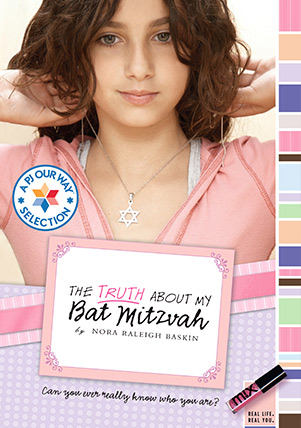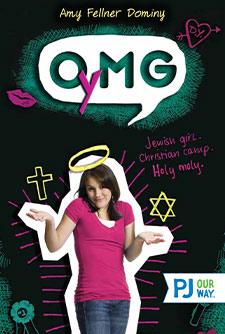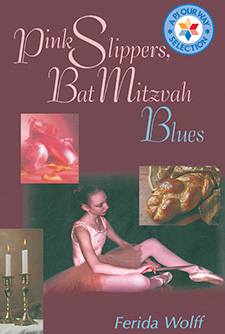The Truth About My Bat Mitzvah
"If I wear this, will people think I’m Jewish?” When her beloved grandmother, Nana, dies and leaves her a Star of David necklace, Caroline becomes curious about her Jewish identity. She thinks she might want a Bat Mitzvah like her best friend Rachel, but what is a Bat Mitzvah anyway, and what will her non-Jewish dad think?
Average Rating
( hint: Login to leave a review! )
92 Reviews
Leave Review
What the Book is About
Jewish Content & Values
Positive Role Models
Content Advisory
Talk it Over!
More for You
What the Book is About
Raised secular (her mother is Jewish and her father is Christian), twelve-year-old Caroline does not identify as Jewish until her Nana’s death and the inheritance of her Nana’s Magen David (Star of David) inspire her to learn more about her Jewish identity. Caroline ultimately discovers that becoming a Bat Mitzvah is her birthright, party or not!
Jewish Content & Values
- Caroline’s best friend, Rachel, prepares for her Bat Mitzvah (Jewish girl’s coming-of-age ceremony) for over a year. Caroline’s Great Aunt Gert assures Caroline that becoming a Bat Mitzvah is automatic; when a girl turns twelve, she traditionally becomes a responsible Jewish adult.
- Caroline remembers Nana’s Yiddish phrases and traditional Jewish food.
- Although Caroline searches for her identity, the story is light on details of Jewish concepts and practice. Caroline decides to skip school on Yom Kippur (Day of Atonement) because it’s her “birthright to play hooky,” without knowing what Yom Kippur is or what customs are associated with it.
Positive Role Models
- Nana: Caroline has many good memories of Nana. Nana provided Caroline with positive Jewish associations and unconditional love.
- Rachel: Caroline’s best friend, Rachel, lives a more traditional Jewish lifestyle and inspires Caroline to think about what it means to have a Bat Mitzvah.
- Caroline: When a “popular” girl makes prejudiced remarks about Jews aimed at Rachel, Caroline confronts the girl, even though she is unsure about her own Jewish identity.
Content Advisory
- Caroline’s grandmother’s death is central to this book. It is addressed in a sensitive way, and should be accessible to most kids.
- When Caroline sleeps over at the house of a popular girl named Lauren who is not Jewish, Lauren comments that she did not know that Rachel was Jewish because she didn’t “look Jewish.” This is a tense scene, but it serves to bolster Caroline’s determination to be proud of her heritage.
Talk it Over!
Bar/Bat Mitzvah: Traditionally, Jews have marked a young person’s coming of age with a Bar Mitzvah for boys at age thirteen and a Bat Mitzvah for girls at age twelve. According to the Talmud (books of Jewish law), these ages represent physical maturity and the point at which a person becomes responsible for his/her actions. In what ways are you different now than you were when you were younger? What things do you do that show more responsibility?
More for You
Yom Kippur: Considered the most serious day of the Jewish calendar, Yom Kippur is the only fast day that is mentioned in the Torah (first five books of the Bible). In ancient times, Yom Kippur was a day highlighted by sacrifices and rituals that took place in the Beit Hamikdash (the ancient Jewish temple that was destroyed in the year 70 C.E.). Today, it is observed by spending the day in self-reflective prayer without eating or drinking from sundown to sundown. Yom Kippur is a holiday where forgiving those we have treated badly becomes a community affair. Though a serious holiday, Yom Kippur is also considered to be a joyous occasion when forgiveness and the promise of resolution are all but assumed and assured.
What the Book is About
What the Book is About
Raised secular (her mother is Jewish and her father is Christian), twelve-year-old Caroline does not identify as Jewish until her Nana’s death and the inheritance of her Nana’s Magen David (Star of David) inspire her to learn more about her Jewish identity. Caroline ultimately discovers that becoming a Bat Mitzvah is her birthright, party or not!
Jewish Content & Values
Jewish Content & Values
- Caroline’s best friend, Rachel, prepares for her Bat Mitzvah (Jewish girl’s coming-of-age ceremony) for over a year. Caroline’s Great Aunt Gert assures Caroline that becoming a Bat Mitzvah is automatic; when a girl turns twelve, she traditionally becomes a responsible Jewish adult.
- Caroline remembers Nana’s Yiddish phrases and traditional Jewish food.
- Although Caroline searches for her identity, the story is light on details of Jewish concepts and practice. Caroline decides to skip school on Yom Kippur (Day of Atonement) because it’s her “birthright to play hooky,” without knowing what Yom Kippur is or what customs are associated with it.
Positive Role Models
Positive Role Models
- Nana: Caroline has many good memories of Nana. Nana provided Caroline with positive Jewish associations and unconditional love.
- Rachel: Caroline’s best friend, Rachel, lives a more traditional Jewish lifestyle and inspires Caroline to think about what it means to have a Bat Mitzvah.
- Caroline: When a “popular” girl makes prejudiced remarks about Jews aimed at Rachel, Caroline confronts the girl, even though she is unsure about her own Jewish identity.
Content Advisory
Content Advisory
- Caroline’s grandmother’s death is central to this book. It is addressed in a sensitive way, and should be accessible to most kids.
- When Caroline sleeps over at the house of a popular girl named Lauren who is not Jewish, Lauren comments that she did not know that Rachel was Jewish because she didn’t “look Jewish.” This is a tense scene, but it serves to bolster Caroline’s determination to be proud of her heritage.
Talk it Over!
Talk it Over!
Bar/Bat Mitzvah: Traditionally, Jews have marked a young person’s coming of age with a Bar Mitzvah for boys at age thirteen and a Bat Mitzvah for girls at age twelve. According to the Talmud (books of Jewish law), these ages represent physical maturity and the point at which a person becomes responsible for his/her actions. In what ways are you different now than you were when you were younger? What things do you do that show more responsibility?
More for You
More for You
Yom Kippur: Considered the most serious day of the Jewish calendar, Yom Kippur is the only fast day that is mentioned in the Torah (first five books of the Bible). In ancient times, Yom Kippur was a day highlighted by sacrifices and rituals that took place in the Beit Hamikdash (the ancient Jewish temple that was destroyed in the year 70 C.E.). Today, it is observed by spending the day in self-reflective prayer without eating or drinking from sundown to sundown. Yom Kippur is a holiday where forgiving those we have treated badly becomes a community affair. Though a serious holiday, Yom Kippur is also considered to be a joyous occasion when forgiveness and the promise of resolution are all but assumed and assured.



